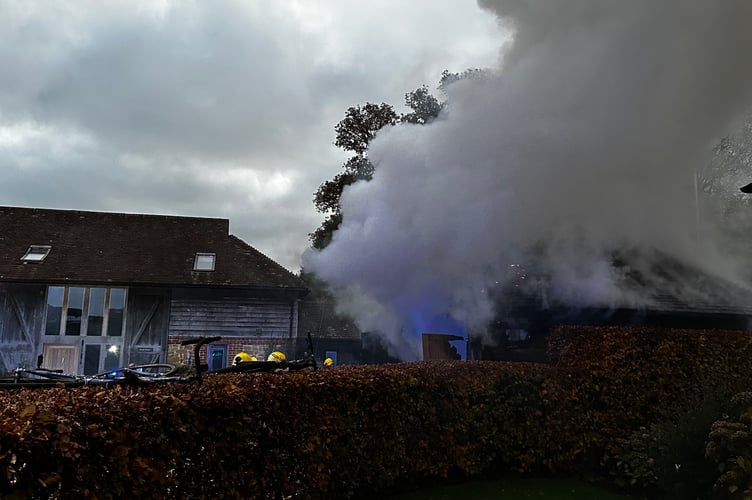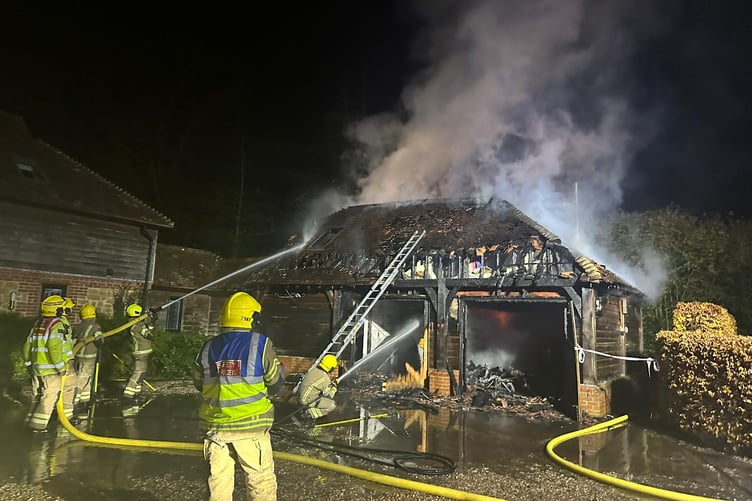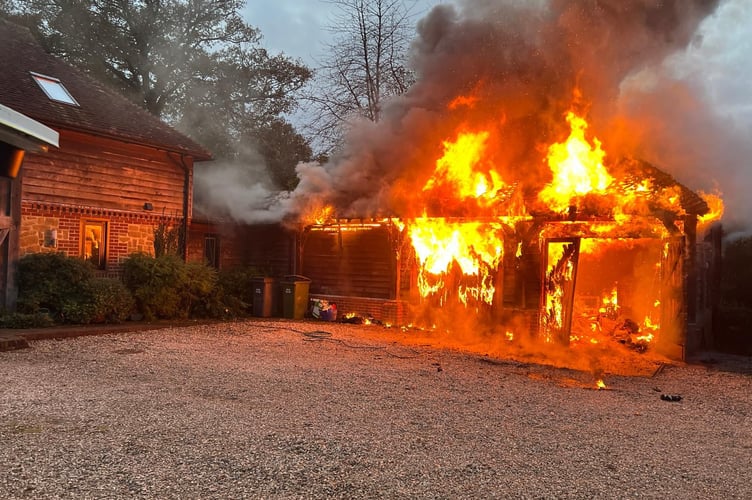There are few things as terrifying as watching your house burn and not knowing if you’re about to lose it all. As a young girl, I had a fire escape plan. I would open my window, toss my single mattress out, then follow behind. It didn’t matter that it might not fit or that jumping a storey was dangerous.
Then I grew up, and the fear disappeared. But on November 15, 2024, when our garage went up in flames, I had no plan and I had never been more scared.
It was a normal Friday. I was working from home when my mum asked me to help load the car for my brother-in-law’s 30th birthday – I had even baked a cake. As we were putting bags in the boot, my mum saw flames. She yelled for my dad. By the time he arrived, it was too late. Our wood-burning boiler, used almost daily for 15 years, had sparked a blaze in a garage stacked with wood, lighter fluid, and gas canisters. My dad shouted for us to call 999; my mum did at 4.01pm.

It was chaos – the roar of fire, the fire alarms going off, the deafening bangs of gas canisters exploding – it felt like we were in a war zone. We got the dogs out, and I ran to close doors between the garage and the house. My mum told us to move the cars. At the time, I think she was worried about the fire spreading, but it probably helped save the rest of the house. We live down a single-track road, and if we hadn’t moved them, the fire engines would have lost precious time.
Within minutes, flames reached the roof. My younger sister’s bedroom, directly above the garage, was being destroyed. When I couldn’t find one of the dogs, panic took over. Then I did the one thing you’re never supposed to do: I went back inside. My heart was pounding, but I found her and got both dogs to our neighbour.
By then, there was nothing left to do but watch. Part of the roof collapsed, the heat was intense, and the fire was unstoppable. It was then that I cried. I really thought we were going to lose everything.
But at 4.24pm, the first fire service responder arrived: Station Commander Jo Crow from Farnham Fire Station.
“I was first on the scene,” he told me seven months later in an interview. “I was listening to messages on the way in and saw this massive plume of smoke. As soon as I arrived, I knew it was a significant fire, but there wasn’t much I could do – I was in a response car.

“I immediately got a plan in place and requested six pumps, a water carrier, and an aerial ladder to get in from the top. It was a fiercely burning fire. I’ve seen a few like it in my 28 years, but it was an intense blaze.”
By 4.30pm, three engines from Surrey and three from Hampshire had arrived, along with a water carrier. There were 30 firefighters in total. Jo explained that Surrey Fire and Rescue has attended 2,576 house fires in the past five years. Domestic callouts dropped 9 per cent in 2024 compared with 2023, with 411 incidents last year. Yet cooking alone accounts for 18 per cent of fires – the biggest single cause.
“Even with fewer fires overall, the impact is massive,” Jo said. “It’s not just property; it’s someone’s life.”
The first step for firefighters is always to ensure no one is inside.
“If there isn’t, our approach becomes defensive,” Jo said. “If no one is at risk, there is less risk involved for the fire service.”
We watched from our neighbours’ house as the fire service spent nine hours tackling the intense blaze, using a thermal imaging camera and breaking the roof tiles to get better access. The electrics leading to the main part of the house had started to melt, meaning if the fire service hadn’t got there when they did, we would have lost it all.

It is thanks to the fire service that my family still has a home. But a fire doesn’t end when the flames go out. Jo calls the aftermath the “ripples”: the long-term emotional impact on people and families. For my mum, the hardest part came after the fire. At the time, you can’t process it, the shock and loss comes later, when cataloguing for the insurance what was destroyed, and during the rebuild where for months everything is out of your control.
Her advice to everyone is to make sure you know what you have, so you know what you lose if you ever have a fire. Receipts and evidence are paramount; without them, you cannot claim. For my dad, he wants people to make sure what insurance cover they have. When the worst happens, you want to know that you have something to catch you.
Jo explained that the fire service experiences those ‘ripples’ too. “We see some harrowing things. There’s a bit of bravado, but really it’s about talking. After an incident, we come back, have a cup of tea, and discuss it. For really bad incidents, there are stress debriefs, counselling, wellbeing checks, and support for families. PTSD is a risk – people bottle things up and take it home. But we stress that it’s okay not to be okay.”
The experience also highlighted the importance of fire prevention and knowing what to do if the worst happens. Jo says: “Don’t try to fight a fire – even though your home is your life, it’s not worth risking your life. Get low, get out, stay out, and call 999. Seconds matter.”
Other advice includes keeping doors shut to contain smoke, checking smoke alarms weekly, and ensuring one is installed on every floor. Never leave cooking unattended, don’t charge devices while asleep, and in rural areas, use the what3words app to help firefighters find you quickly. Moving cars and opening gates, if safe, can save valuable time.
Cooking fires are the most common type of domestic fire in Surrey, which is why vigilance in the kitchen is so important. Fires can start instantly, and once a blaze reaches gas canisters, stacks of wood, or other combustibles, it can be unstoppable.
“Watching a house fire is hard – that’s someone’s life you’re watching burn, even though it’s not your own,” said Jo. “Hopefully it will never happen and you’ll never need us, but we do a lot of prevention work and offer free home visits to those who are vulnerable, to check their homes. We also have a lot of advice online.”
It has been almost a year since I lost half my home, and we all still feel those ripples. It hits when you suddenly remember something else that has been lost – our Christmas decorations, my mum’s wedding dress, everything my sister owned. When a piece of toast got slightly burnt at my sister’s house and her smoke alarm went off, my dog didn’t stop shaking for an hour.
But without the fire service, we would have no home. So thank you to every single firefighter who risks their lives so we can keep ours.
I wanted to use this horrific experience to highlight the extraordinary efforts firefighters go to, the effects a house fire can have, and what others can do to reduce the risk. I know that we were lucky. No one was hurt, and we didn’t lose everything. Fire is something that can happen to anyone, even if nobody thinks it will happen to them.





Comments
This article has no comments yet. Be the first to leave a comment.